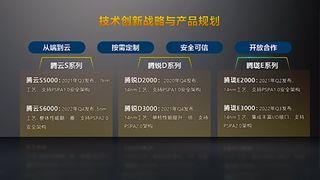
Chinese microprocessor designer Phytium, which not too long ago launched its new 64-core processor for servers, this week disclosed its formidable roadmap that spans until 2022. The company intends to develop its product lineup and the checklist of its manufacturing companions.
Phytium was initially established as a designer of server and HPC processors as China couldn’t acquire modern CPUs from AMD and Intel on account of export restrictions on high-performance elements. All through its historical past, the corporate additionally designed processors for client PCs, however these have been byproducts of its server business.
Nevertheless going ahead, multi-core server processors will stay the Phytium’s major goal, however the firm additionally plans to launch new lineups of SoCs for desktop and embedded purposes that will be presumably made by SMIC or UMC.
Servers
Phytium’s newest 64-core FT-2000+/64 and Tengyun S2500 processors are made by TSMC utilizing its 16nm course of know-how, to a big diploma as a result of modern manufacturing capacities on the world’s largest maker of semiconductors are reserved years forward by large clients like Apple.
Within the subsequent couple of years Phytium will lastly undertake TSMC’s subtle 7nm and 5nm nodes. Someday in Q3 2021 the corporate intends to launch its Tengyun S5000 CPU that will probably be made utilizing TSMC’s 7nm know-how and can help Phytium’s PSPA 1.0 safety know-how.
By late 2022 the chip developer intends to launch its Tengyun S6000 processor that will probably be fabbed at TSMC’s 5nm node and can ‘double’ efficiency.
Pythium doesn’t disclose actual core counts it’s for its next-generation CPUs, however, it’s secure to say that extra superior course of applied sciences will allow the corporate to spice up per-core efficiency of its chips in addition to improve its core rely to at least 128 cores.
Desktops
The following technology — the Tengrui D3000 — is deliberate to be launched by the end of 2021. The brand new Tengrui D-series processors may also help PSPA 1.0 and PSPA 2.0 applied sciences. Each CPUs will probably be made utilizing a 14nm course of know-how
Embedded
Along with desktop-oriented Tengrui D-series processors, Phytium plans to launch Tengrui E-series CPUs for embedded purposes. The Tengrui E2000 chips will probably be launched in Q2 2021, whereas extra superior Tengrui E3000 with improved I/O capabilities will probably be unveiled in Q3 2022. Identical to their desktop counterparts, the E3000 will probably be made utilizing a 14nm node.
SMIC or UMC?
Phytium has traditionally used TSMC’s manufacturing providers, however with its Tengrui D and Tengrui E-series the corporate plans to make use of a 14nm course of know-how. TSMC doesn’t supply a 14nm course of, however its rivals SMIC and UMC do.
SMIC is based in China and solely began manufacturing utilizing its 14nm know-how in This autumn 2019. Proper now, the corporate is ramping up its 14nm production in addition to increase capability. Given the truth that Phytium is a China-based firm, it is smart for it to make use of SMIC’s providers. In the meantime, SMIC’s expertise with excessive quantity manufacturing (HVM) of 14nm chips is restricted to 15,000 300-mm wafers at greatest to this point.
UMC began to supply its 14nm know-how to shoppers a few years in the past, however its manufacturing volumes have by no means been sizeable. To that end, UMC’s expertise with 14nm HVM can be restricted.